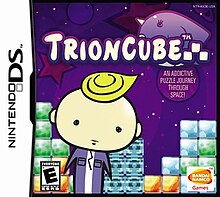| Trioncube | |
|---|---|
 North American cover art | |
| Developer(s) | Namco Bandai Games |
| Publisher(s) | Namco Bandai Games |
| Producer(s) | Hideo Yoshizawa |
| Designer(s) | Kouji Asuna |
| Composer(s) | Ryuichi Takada |
| Platform(s) | Nintendo DS |
| Release | |
| Genre(s) | Puzzle |
| Mode(s) | Single-player, multiplayer |
Trioncube[a] is a puzzle video game developed by Namco Bandai Games and released for the Nintendo DS.
Gameplay
[edit]The game is a 'falling block' title, a la Tetris, and features many similar blocks. The objective of the game is to form 3×3 squares to clear blocks and reach a set objective (unless playing in endless mode). Once a 3×3 square has been formed, more pieces can be attached to form more 3×3 squares and clear other blocks on the screen. These chains will remain on screen until a piece is placed which does not add to it.
The single-player section features an arcade mode, a story mode which adds concepts such as useless blocks, and an endless mode. The game also contains two player multiplayer via WiFi, which supports both single-cart and multi-cart play.
Development
[edit]Trioncube was developed by Namco Bandai Games. The game was chiefly designed by Kouji Asuna and was produced by Hideo Yoshizawa, known for his work on the Mr. Driller series of puzzle games. The idea for the game came to Asuna while he was at home, watching television after a bath.[4] He had been working on a separate puzzle game at the time and was stuck on how to bring the project together. "Something just clicked in my head as soon as this certain shape appeared on the screen," he explained. "That was the moment Trioncube started to [materialize] in my head."[3] Asuna wanted to make Trioncube unique by emphasizing large combos rather than clearing lines. Asuna considered utilizing the DS touchscreen for moving blocks, but chose not to because "it didn’t really feel natural or make things easier".[3] The game's "cute" aesthetic was also intentional, evolving from a more basic interface to one the design team hoped would appeal to both younger and female players.[4]
Reception
[edit]| Aggregator | Score |
|---|---|
| Metacritic | 55/100[5] |
| Publication | Score |
|---|---|
| Edge | 5/10[6] |
| Eurogamer | 5/10[7] |
| Famitsu | 25/40[8] |
| Game Informer | 6/10[9] |
| GameSpot | 5.3/10[10] |
| GameZone | 6/10[11] |
| IGN | 5.5/10[12] |
| Nintendo Life | |
| Nintendo Power | 5.5/10[14] |
| Nintendo World Report | 4.5/10[15] |
| Pocket Gamer |
The game received "mixed" reviews according to the review aggregation website Metacritic.[5] It was said to be far too easy,[10] with the slow pace of the game giving a lack of challenge and making it dull.[7] ONM mentioned that the game was not as addictive as Tetris, and there were better puzzle games on the DS.[17] In Japan, Famitsu gave it a score of 25 out of 40.[8] GamePro said, "In the end, Trioncube doesn't offer much for a puzzle game. There's little depth or difficulty to be found, and while the odd story is surprisingly entertaining, it isn't enough to keep you playing for long."[18][b]
Notes
[edit]References
[edit]- ^ Surette, Tim (2007-02-20). "Shippin' Out February 19–23: Big names for next-gens, PC". GameSpot. Fandom. Archived from the original on 2015-12-31. Retrieved 2024-08-17.
- ^ 気持ちよさ連鎖パズル トリオンキューブ [Kimochiyo-sa Rensa Pasuru Trioncube]. Nintendo (in Japanese). Archived from the original on 2024-02-27. Retrieved 2024-08-17.
- ^ a b c Burman, Rob (2007-06-05). "Namco: 'Anyone can Create Original Games'". IGN. Ziff Davis. Archived from the original on 2019-10-16. Retrieved 2024-08-17.
- ^ a b Joscelyne, Svend (2007-06-05). "Q&As// Trion Cube Designer: Kouji Asuna". SPOnG. Archived from the original on 2023-01-17. Retrieved 2024-08-17.
- ^ a b "Trioncube". Metacritic. Fandom. Archived from the original on 2024-08-17. Retrieved 2024-08-17.
- ^ Edge staff (March 2007). "Trioncube [Import]". Edge. No. 173. Future plc. p. 86.
- ^ a b Bramwell, Tom (2007-04-26). "Trioncube [Import]". Eurogamer. Gamer Network. Archived from the original on 2012-08-05. Retrieved 2024-08-17.
- ^ a b "気持ちよさ連鎖パズル トリオンキューブ". Famitsu (in Japanese). Enterbrain. Archived from the original on 2015-12-21. Retrieved 2024-08-18.
- ^ Miller, Matt (April 2007). "Trioncube". Game Informer. No. 168. GameStop. Archived from the original on 2007-03-25. Retrieved 2024-08-18.
- ^ a b VanOrd, Kevin (2007-03-02). "Trioncube Review [score mislabeled as "5/10"]". GameSpot. Fandom. Archived from the original on 2007-03-05. Retrieved 2024-08-18.
- ^ David, Mike (2007-03-09). "Trioncube - NDS - Review". GameZone. Archived from the original on 2009-02-28. Retrieved 2024-08-18.
- ^ Harris, Craig (2007-02-27). "Trioncube Review". IGN. Ziff Davis. Archived from the original on 2022-09-02. Retrieved 2024-08-17.
- ^ McFerran, Damien (2007-06-08). "Trioncube Review". Nintendo Life. Hookshot Media. Archived from the original on 2023-03-31. Retrieved 2024-08-17.
- ^ "Trioncube". Nintendo Power. Vol. 213. Nintendo of America. March 2007. p. 89.
- ^ Kaluszka, Aaron (2007-04-05). "Trioncube". Nintendo World Report. NINWR, LLC. Archived from the original on 2023-09-01. Retrieved 2024-08-18.
- ^ Pickering, Chris (2007-03-05). "Trioncube [Import]". Pocket Gamer. Steel Media Ltd. Archived from the original on 2024-08-18. Retrieved 2024-08-18.
- ^ "Trioncube". Official Nintendo Magazine. Future plc. August 2007. p. 86.
- ^ Hamster4Sale (April 2007). "Trioncube" (PDF). GamePro. No. 223. IDG. p. 82. Archived from the original on 2007-10-22. Retrieved 2024-08-18.
{{cite magazine}}: CS1 maint: numeric names: authors list (link)